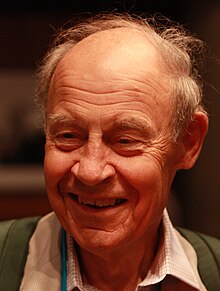Dudley Herschbach
| Dudley R. Herschbach | |
|---|---|

Herschbach at the 2012 Lindau Nobel Laureate Meeting
|
|
| Born | Dudley Robert Herschbach June 18, 1932 San Jose, California, United States |
| Nationality | United States |
| Fields | Chemistry |
| Institutions |
University of California, Berkeley Harvard University Freiburg University Texas A&M University |
| Alma mater |
Harvard University Stanford University |
| Doctoral advisor | Edgar Bright Wilson |
| Doctoral students | Richard N. Zare |
| Known for | Molecular dynamics |
| Notable awards | ACS Award in Pure Chemistry (1965) Linus Pauling Medal (1978) RSC Michael Polanyi Medal (1981) Irving Langmuir Award (1983) Nobel Prize in Chemistry (1986) National Medal of Science (1991) ASCR Jaroslav Heyrovsky Medal (1992) Sierra Nevada Distinguished Chemist Award (1993) ACS Gennady Michael Kosolapoff Award (1994) AICE William H. Walker Award (1994) Council of Scientific Society President’s Award (1999) American Institute of Chemists Gold Medal (2011) |
Dudley Robert Herschbach (born June 18, 1932) is an American chemist at Harvard University. He won the 1986 Nobel Prize in Chemistry jointly with Yuan T. Lee and John C. Polanyi "for their contributions concerning the dynamics of chemical elementary processes." Herschbach and Lee specifically worked with molecular beams, performing crossed molecular beam experiments that enabled a detailed molecular-level understanding of many elementary reaction processes. Herschbach is a member of the Board of Sponsors of the Bulletin of the Atomic Scientists.
Herschbach was born in San Jose, California on June 18, 1932. The eldest of six children, he grew up in a rural area. He graduated from Campbell High School, where he played football. Offered both athletic and academic scholarships to Stanford University, Herschbach chose the academic. His freshman advisor, Harold S. Johnston, hired him as a summer research assistant, and taught him chemical kinetics in his senior year. His master's research involved calculating Arrhenius A-factors for gas-phase reactions. Herschbach received a B.S. in mathematics in 1954 and an M.S. in chemistry in 1955 from Stanford University.
Herschbach then attended Harvard University where he earned a A.M. in physics in 1956 and a Ph.D. in chemical physics in 1958 under the direction of Edgar Bright Wilson. At Harvard, Herschbach examined tunnel splitting in molecules, using microwave spectroscopy. He was awarded a three-year Junior Fellowship in the Society of Fellows at Harvard, lasting from 1957 to 1959.
...
Wikipedia
